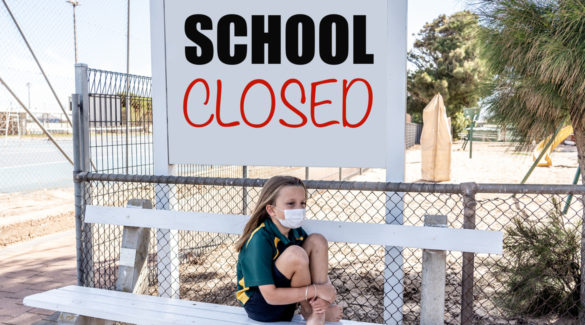School choice gained ground in 2002 in response to lockdown policies
(The Center Square) – More parents overwhelmingly chose school choice in 2022 after expressing frustration with lockdown policies, school boards and mandates. As more state legislators look to expand school choice policies in 2023, Florida is seen as a model to follow, according to several reports and polls taken throughout the year.
In 2022, the majority of parents surveyed in a major study said they wanted other options for their children’s education other than the public school districts their children were zoned to attend.
In “Never Going Back: An Analysis of Parent Sentiment on Education,” the National Alliance for Public Charter Schools surveyed more than 5,000 parents to learn more about the reasons why they increasingly chose different educational options after the 2020-2021 school year.
According to the survey, 93% of parents surveyed said one size doesn’t fit all in education. More than 25% said they switched the type of school their children attended; 86% said they want different options for their children to attend a school other than in the district where they are zoned or assigned to attend.
Among parents who switched schools, charter schools were a popular choice. Roughly three in four parents surveyed said they want more public charter school offerings in their area.
Nearly 90% of parents surveyed said after switching school types, they or their children experienced a positive change as a result of the switch; 57% said their children were happier.
Roughly 83% of parents said education had become a more important political issue in 2022 than it was in the past. Nearly as many, 82%, said they were willing to vote outside of their party when it comes to educational issues.
The 2022 report followed a 2021 report, “Voting with Their Feet: A State-level Analysis of Public Charter School and District Public School Enrollment Trends,” which found that at least 1.4 million students left their district schools during state lockdowns in the 2020-2021 school year. The report, which analyzed data from 42 state educational agencies, also found that nearly 240,000 new students enrolled in public charter schools during the same period.
After schools began lockdowns and remote learning in the spring of 2020 and parents began observing what was being taught in the classroom or learned that only a few hours of remote learning instruction were being provided a week, enrollment in charter schools, private schools, and home schooling surged nationwide, the report notes. At the same time, enrollment in district schools plummeted.
“The data suggests parents like the freedom to choose the best educational experience for their children,” the report states. “This is true across all races, political ideologies, and geographies. It may be the one thing just about everyone in America can agree on. Choice is better, and now that parents know what it feels like, we think it is likely they are never going to give it up and go back to the way it used to be.”
This also was after significant learning losses were reported among K-12 students in 2021, a direct result of school shutdowns, remote learning and social and emotional isolation resulting from state and local policies, several reports found last year. Mental health concerns stemming from lockdown policies also were increasingly reported by parents.
In Arizona, Gov. Doug Ducey signed into law a universal school choice program that makes all Arizona’s school-age children eligible for Empowerment Scholarship Accounts, a state-funded account that lets parents spend money on tuition and other education expenses. Before this bill became law in the summer of 2022, the state limited this account to disabled students, those in failing schools, and other specific circumstances.
Many groups and state legislators are hoping to replicate Florida’s educational success in 2023. Florida was seen as a beacon of school choice and academic excellence in 2022 after Gov. Ron DeSantis and the state legislature blocked school districts from closing schools, opposed mask mandates and prioritized parental rights in education legislation.
The results were improved academic outcomes across all indexes, according to 2022 National Assessment of Educational Progress data. The national rankings indicated that Florida students are “well ahead of their peers, especially with younger and educationally at-risk students who were harmed the most from distance-learning in other states,” DeSantis said.
NAEP ranked Florida’s students third nationwide in Grade 4 reading and fourth in Grade 4 mathematics. Florida’s Hispanic students also ranked first in the U.S. in 2022 for reading and students closed several educational gaps in a year when many other states were still restricting students from in-person learning.
DeSantis’ message of education freedom in 2022 – including empowering parents, banning “woke” curriculum, and ensuring education transparency – were all policies that resonated with parents in key battleground states, a Democratic polling company reported in July.
By December, another group, Parent Power!, ranked Florida as the state having the greatest parent involvement in education in the U.S. Florida ranked first for digital and personalized learning, first for school choice programs, second for charter schools, and third for teacher quality, according to the survey.
Of the ranking, DeSantis, a father of three young children, said, “Parental involvement is important to a child’s success both in school and in life, and in Florida we are proud to protect parents’ right to be involved in a child’s education. This recognition continues to show that Florida is a national leader in school choice, parent empowerment, and education as a whole.”
In 2022, Florida also launched its first civics program to prepare high school and college graduates for public service and continued to increase investments in higher education and apprenticeship programs.
In 2022, 10 Florida universities also ranked among the best in the world and undergraduate university students paid the lowest tuition rates in the U.S.
Originally published by The Center Square. Republished with permission.
For more great content from School Reform News.
For more from The Heartland Institute.








